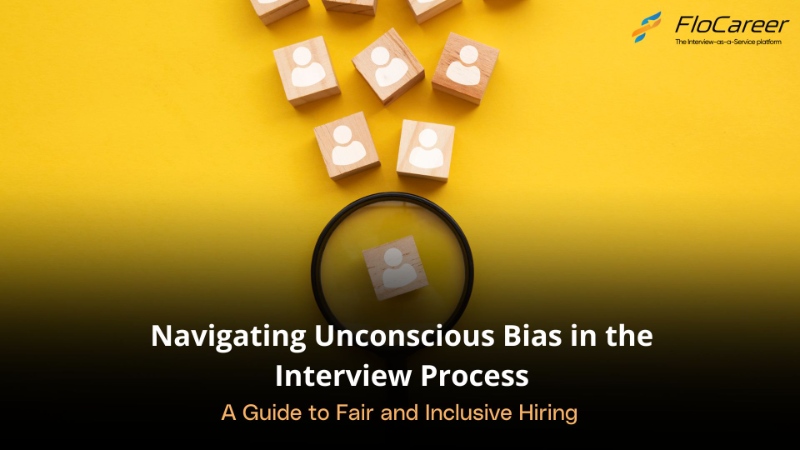Navigating Unconscious Bias in the Interview Process: A Guide to Fair and Inclusive Hiring
The hiring process is a crucial gateway to building a robust and diverse workforce. However, many organizations unwittingly harbor unconscious biases that can adversely affect the quality of interviews and, consequently, the overall hiring process. In this blog, we'll delve into the intricacies of unconscious bias in the interview process and explore effective strategies to mitigate bias. By understanding, acknowledging, and actively addressing unconscious bias, organizations can pave the way for a more inclusive, equitable, and diverse workplace.

Understanding Unconscious Bias:
Unconscious bias involves automatic and unintentional mental associations and attitudes towards individuals or groups, often influenced by factors such as race, gender, age, sexual orientation, or socioeconomic status. These biases can seep into the interview process, leading to unfair assessments of candidates and hindering the hiring process. Recognizing and mitigating these biases is essential for fostering a workplace that accurately values the skills and potential of all candidates.
Types of Unconscious Bias in Interviews:
Affinity Bias: Favoring candidates who resemble the interviewer in terms of race, gender, or background.
Confirmation Bias: Focusing on information that aligns with pre-existing beliefs about a candidate.
Halo/Horn Effect: Forming a positive/negative overall impression based on one notable attribute.
Attribution Bias: Attributing a candidate's success or failure to internal characteristics rather than external factors.
Impact of Unconscious Bias in Interviews:
Unconscious bias can manifest in various detrimental ways during interviews, leading to affinity-based hiring, stereotype threats for candidates, and skewed perceptions of qualifications. These biases can hinder diversity in the workplace and perpetuate unintentional discrimination.
Strategies to Mitigate Unconscious Bias:
1. Standardize the Interview Process:
Implement Standardized Questions: Develop a set of predetermined questions that focus on assessing qualifications and skills relevant to the job. Standardization ensures that all candidates are evaluated using the same criteria.
Evaluate Based on Qualifications: Emphasize the importance of qualifications and skills over personal background or characteristics. By adhering to standardized criteria, interviewers can avoid subjective judgments influenced by unconscious bias.
2. Provide Unconscious Bias Training:
Raise Awareness: Conduct training sessions to increase awareness among interviewers about the existence and impact of various types of unconscious bias. Creating a shared understanding of bias sets the stage for proactive mitigation.
Equip with Mitigation Strategies: Empower interviewers with strategies to recognize and address unconscious bias during interviews. Training should include practical techniques for maintaining objectivity and fair assessments.
3. Diversify Interview Panels:
Create Diverse Panels: Form interview panels that bring together individuals with different backgrounds, experiences, and perspectives. Diverse panels help counteract affinity bias and promote a holistic evaluation of candidates.
Foster Inclusivity: Ensure that the composition of interview panels reflects a range of backgrounds. Inclusivity within the panel contributes to fairer assessments and reduces the likelihood of bias influencing hiring decisions.
4. Blind Resume Screening:
Remove Identifying Information: Implement blind screening by removing personal identifiers such as names, gender, and race from resumes during the initial screening phase. This practice shifts the focus to qualifications rather than extraneous details.
Qualification-Focused Evaluation: Instruct interviewers to prioritize qualifications when reviewing resumes. By adopting a blind screening approach, organizations mitigate unconscious bias and promote a more objective assessment process.
5. Leverage Technology:
Utilize Video Interviews: Incorporate video interviews with pre-recorded questions to minimize affinity bias. Video interviews allow interviewers to focus solely on candidates' responses without visual cues that may trigger unconscious bias.
Explore Machine Learning Algorithms: Consider the use of machine learning algorithms for analyzing candidate responses. These algorithms can provide an objective assessment of language and content, reducing the potential for bias in the evaluation process.
6. Conduct Post-Interview Evaluations:
Collect Comprehensive Feedback: Gather feedback from both interviewers and candidates to comprehensively assess the effectiveness of bias reduction strategies. Understanding the perspectives of all stakeholders is crucial for refining the hiring process.
Continuous Improvement: Establish a feedback loop for continuous improvement. Regularly review feedback and insights gained from post-interview evaluations to identify areas for enhancement and ensure an evolving, unbiased hiring process.
By implementing these strategies, organizations can actively address unconscious bias in the interview process, fostering a fair, inclusive, and equitable environment for all candidates. At Flocareer, we are dedicated to assisting organizations in achieving unbiased and effective hiring outcomes.
The Importance of Diversity and Inclusion:
Diversity and inclusion are integral to organizational success, fostering innovation, creativity, and problem-solving. A lack of diversity can lead to groupthink and reduced profitability. Promoting diversity and inclusion in the hiring process involves inclusive job postings, partnerships with diverse organizations, and leveraging social media for outreach.
Using Technology to Mitigate Unconscious Bias:
Technology can play a crucial role in reducing unconscious bias. Video interviews, machine learning algorithms, and blind resume screening are effective tools when used ethically and without bias. They contribute to fairer assessments, ensuring that candidates are evaluated based on merit and qualifications.
Conducting Post-Interview Evaluations:
After interviews, organizations should evaluate the success of their bias reduction strategies. Feedback from interviewers and candidates provides valuable insights, enabling continuous improvement and refinement of the hiring process.
Unconscious bias poses a significant threat to the quality and fairness of interviews, impacting hiring decisions and organizational diversity. By actively addressing these biases through standardized processes, training, diverse panels, and technological tools, organizations can make more informed, equitable, and inclusive hiring decisions. At Flocareer, we are committed to providing unbiased interview services, ensuring that your organization builds a diverse and talented workforce.
Check out our latest blog on enhancing fair hiring decision


